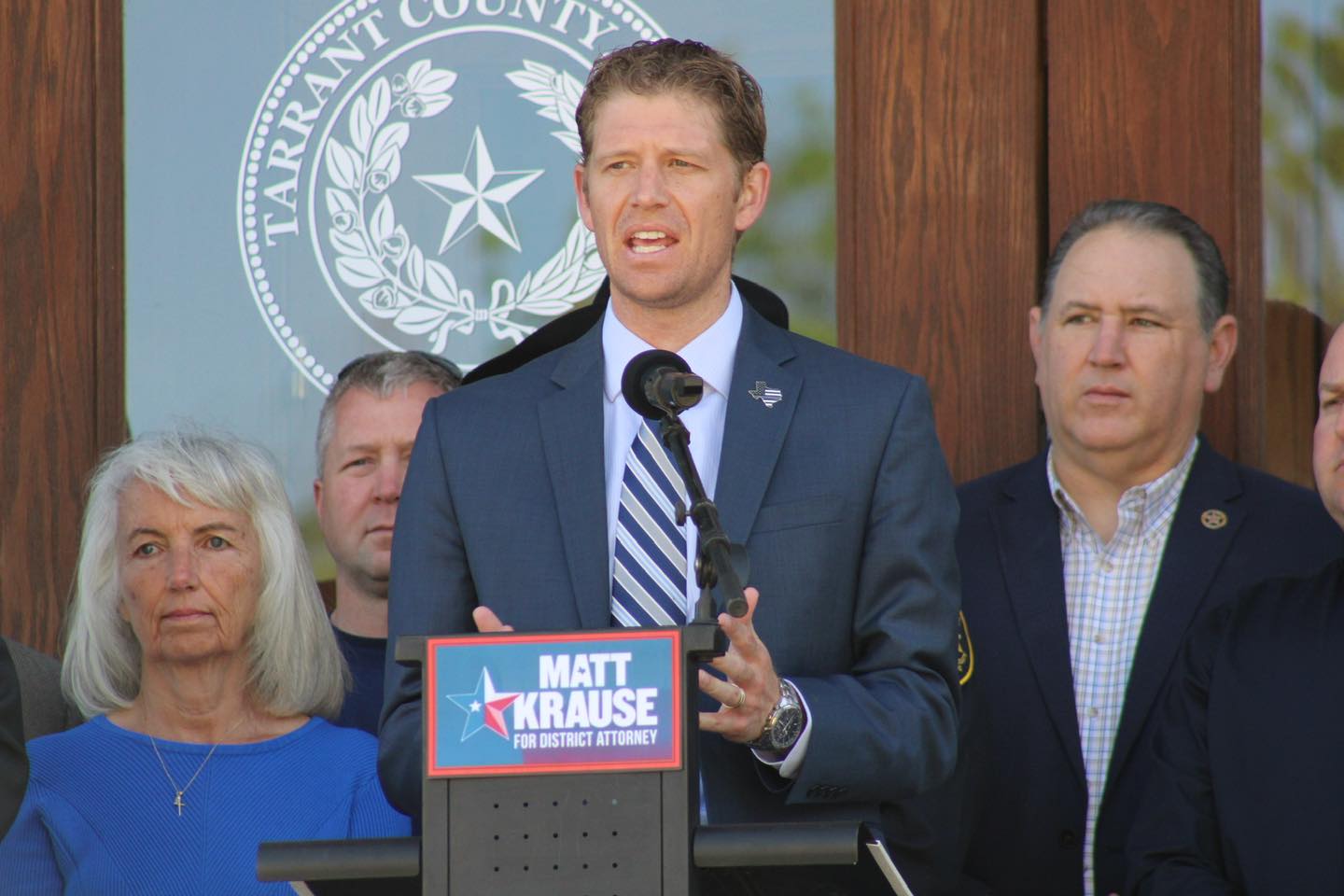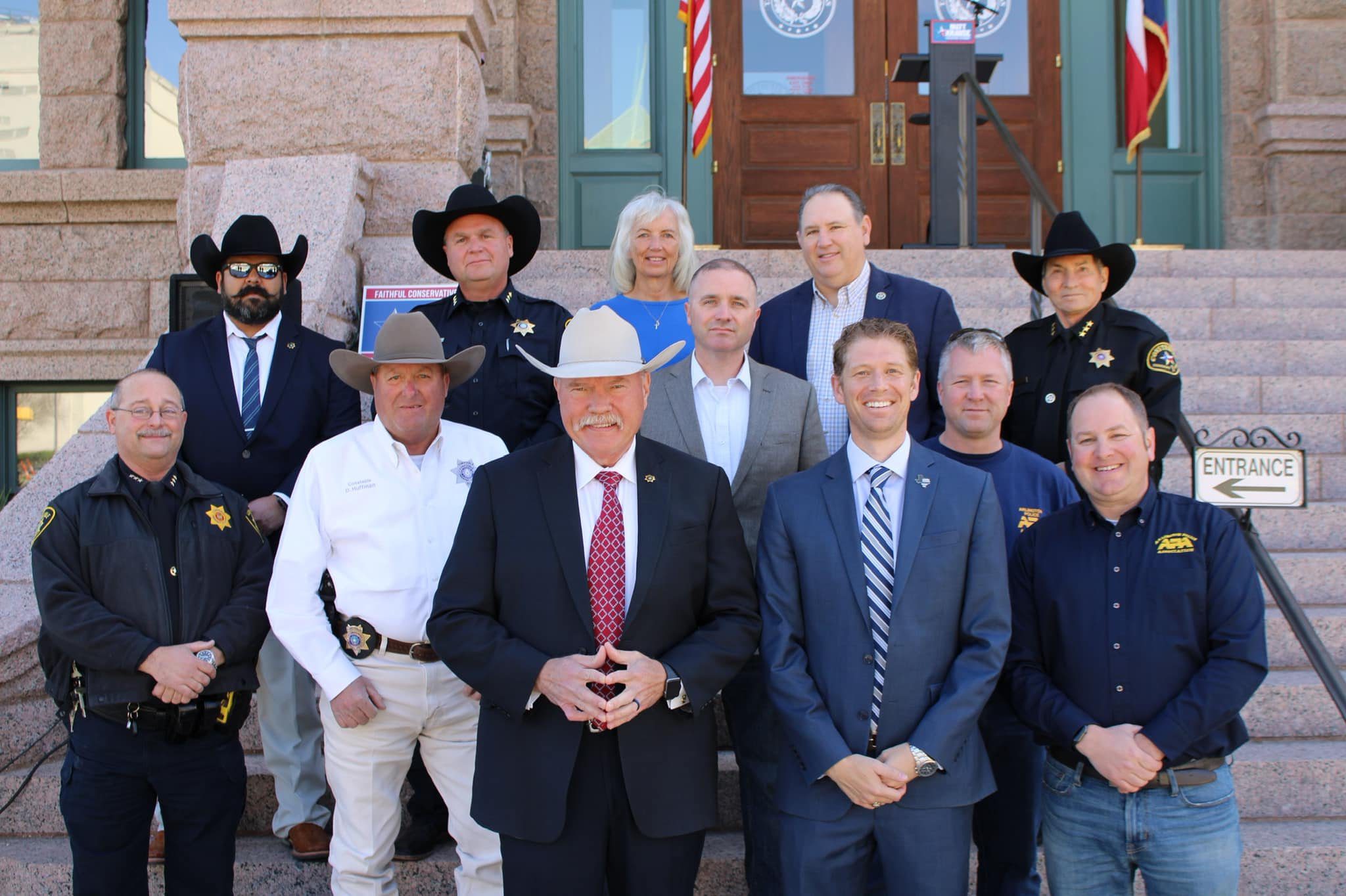The Culture Warrior Prosecutor
The DA race in Fort Worth highlights how the shifting political and legal landscape on trans rights, abortion access, and voting rights is emboldening right-wing attacks that carry criminal consequences.
Michael Barajas | May 20, 2022


Matt Krause started his legislative career fighting to make it harder for Texans to get a divorce.
Starting when he joined the Texas House in 2013, and continuing session after session since, the Fort Worth Republican has filed bills seeking to end or restrict no-fault divorces in the state. And he has mounted other efforts to preserve his conservative Christian ideal for marriage and family over the years, including being one of the state’s most staunch anti-abortion lawmakers and pushing to end benefits for same-sex spouses of government employees—even after the U.S. Supreme Court legalized gay marriage in Texas and across the country in 2015. In recent years, Krause, like much of the Texas GOP, has trained his sights on transgender children, their families, and medical providers who give them gender-affirming care.
Now he is running to be a culture warrior as the next Tarrant County District Attorney. Krause thinks that prosecutors should be on the frontlines in the latest wave of conservative efforts to police trans families.
During a recent candidate forum for a Fort Worth GOP group, he bragged about helping kick-start the latest round of attacks. After failing to pass legislation he authored last session banning gender-affirming care for minors, Krause filed a legal request eventually ballooned into state GOP attempts to reclassify abuse outside of the legislative process; Krause’s request eventually snowballed into a misleading legal opinion by Attorney General Ken Paxton that called gender-affirming care for minors “child abuse.” Governor Greg Abbott then cited that opinion in his directive to state child protection workers to investigate families for seeking such care. A Texas Supreme Court ruling last week largely allows those investigations to continue.
“My approach went after the medical community more than it did the parents,” Krause explained in between asking voters for their support. “I absolutely think that we ought to be prosecuting those medical professionals that engage in this practice.”
Similar decisions await the county’s next DA on a range of issues from the fate of abortion access in a post-Roe world to conservative efforts to ramp up the involvement of law enforcement in elections. The shifting political and legal landscape on civil rights in Texas has emboldened right-wing attacks to carry severe criminal consequences. The attorney general’s office has sought to bring its investigative powers to bear on how people are voting, and the DA’s office in a county far smaller than Tarrant made national headlines recently for charging a woman with murder over an allegedly self-managed abortion.
Krause faces Phil Sorrells, a Trump-endorsed former judge, in a runoff election on Tuesday to decide the GOP nomination for the Tarrant prosecutor’s seat. Whoever prevails will be well positioned to win the November general election and replace longtime Republican DA Sharen Wilson, who is perhaps best known for sending Crystal Mason to prison for a voting mistake. Mason, who is Black, argues that her prosecution was politically and racially charged, and her conviction has since been called into question by the Texas Court of Criminal Appeals (CCA), the state’s highest criminal court.
Krause and Sorrells, neither of whom responded to repeated requests for comment for this story, have both promised in forums and campaign materials to follow in Wilson’s footsteps if elected. Both have indicated they may even dedicate more resources to policing elections; this has been a priority for conservatives in Texas and elsewhere, raising alarms that increased risks of criminal prosecution may ensnare voters over simple mistakes or intimidate others away from voting. Krause said in a campaign forum that he would dedicate a prosecutor to election crimes full time while Sorrells wants to start an “election integrity task force” inside the DA’s office.
Sorrells and Krause have also both slammed a recent CCA ruling that limited Paxton’s ability to prosecute election crimes, saying they’d fill in the gap and prosecute more cases.
Krause has claimed that Wilson, the outgoing DA, effectively asked him to run after announcing that she’d step down last year, before anyone had officially joined the race; Krause had initially launched a campaign to challenge Paxton but bailed from the attorney general race and filed to run in Tarrant County just before Thanksgiving. In the first round of the primary in March, he edged out Mollee Westfall, a longtime judge who had accumulated endorsements, and joined Sorrells in a runoff since neither received 50 percent of the vote.
Sorrells, who is older and folksier than his runoff opponent, also has unimpeachable far-right credentials and is running with the endorsement of former President Donald Trump. Political connections likely helped Sorrells, a longtime judge and former prosecutor, get Trump’s support —Sorrells’ campaign consultant is also a political strategist for Lieutenant Governor Dan Patrick, a far-right figure who has reportedly helped influence the former president’s endorsements in the state and is notorious for his xenophobic tirades.


Sorrells sounds most Trump-like when talking about undocumented immigrants, whom he has made central to his campaign. “The people who are crossing the border illegally, they’re coming here to Tarrant County to commit crime,” he said during a recent campaign forum. “My goal is to hold those people in state custody for as long as we possibly can… until we get somebody else in the White House who’s actually gonna enforce our immigration laws.”
Sorrells’ main critique of his GOP opponent is that he has zero experience in criminal law. But Krause, who worked for a conservative Christian legal advocacy group famous for its homophobia before joining the Texas legislature, is playing up his political career. He tells voters that his experience at the capitol has prepared him to be “a faithful conservative fighter as your next Tarrant County DA.”
Waiting in the wings is longtime prosecutor Tiffany Burks, who has already secured the Democratic nomination. Tarrant County has been a longtime GOP bastion, and Republicans continue to hold all statewide offices—a rare feat for an urban area. It has, however, started to trend blue, narrowly voting for Joe Biden in 2020, the first win by a Democratic presidential candidate here since Texan Lyndon Johnson in 1964, but Democrats have yet to break through locally, failing to oust the sheriff in 2020. They are now eying midterm elections for DA and other local offices like county judge.
Burks, who was chief of the Tarrant DA’s criminal division before resigning last year, told Bolts in an interview that she chose to leave and run to lead the agency because she disagreed with the direction it was taking. Burks also claimed the office was beset with morale problems.


“For me there was no consistency, I wasn’t quite sure what the criteria was for the decisions that were being made,” Burks said. “The community deserves to have a DA that cares about the concerns of all of its citizens, whether you are a Democrat or a Republican or an independent or a libertarian—everyone’s needs in the community matter.”
In addition to facing criticism over her selective prosecution of election laws, Wilson has also drawn the ire of North Texas activists and victims of police brutality who accuse her of failing to hold law enforcement accountable.
During a recent campaign forum, Sorrells insisted one of his main priorities as DA would be to “back the police,” saying, “They have to know that if they need help on anything, that the DA is ready and willing to help—and I’m that guy, I’m going to help them.” Krause also points to his support from local law enforcement officials; he is running with the endorsement of Sheriff Bill Waybourn, a Trump favorite who has become a fixture of the national conservative media in recent years even as deaths have spiked at the local jail on his watch.
Local jail monitors have called for fewer people to be detained pretrial as one remedy to dangerous and deadly conditions, and the county’s bail policies are emerging as one of the major fault lines in the general election.
Burks told Bolts that the DA’s office could help address problems at the jail and reduce crowding by requesting lower bond amounts, and in some cases no cash bonds, when dealing with low-level, nonviolent cases. Sorrells, meanwhile, said at a recent campaign event, “I would oppose all the low bails that are being issued right now, because we’ve got to keep those people in jail.” Krause reiterated his support for state laws to restrict some jail releases.


Pamela Young, an organizer with United Fort Worth who has called for Waybourn’s resignation over the string of scandals at his jail, said local activists tried to schedule a forum for people impacted by the criminal legal system to ask questions of all three Democrats running for DA before the March 1 primary. Only one participated, Albert Roberts, who was his party’s nominee against Wilson in 2018, losing by six percentage points. Burks was a no-show for the forum alongside a third candidate. (Burks easily won the primary with 60 percent of the vote.)
“That speaks to where we have to continue moving—putting people forward who have been impacted the most, whose communities have been harmed the most and affected the most by the criminal legal system,” Young told Bolts. “No matter who is in that DA’s office—even if Sharen Wilson ran and won again—no matter who is there, we have to continue the work of fighting to get our people free, bottom line.”
The news earlier this month that the U.S. Supreme Court may be poised to overturn Roe vs. Wade now also looms large over this DA election.
Texas has a so-called trigger ban that would immediately criminalize abortion in the state if Roe falls next month. Elizabeth Sepper, a scholar of health law at the University of Texas at Austin, told Bolts that a pre-Roe law on the books in Texas could threaten charges against not just abortion providers but potentially also others who help pregnant people access abortion—like partners, family members or friends. Texas also made it a felony last year to give someone abortion-inducing medication after seven weeks of pregnancy, effectively criminalizing medication abortion. Sepper suspects that some prosecutors in Texas are eager to test the bounds of those laws.
Sepper also worries about more pregnant people in the state being at risk for prosecution in a post-Roe future, pointing to a case last month where authorities near the Texas-Mexico border jailed and prosecuted a woman for murder, allegedly after self-managing her own abortion, despite state law clearly exempting pregnant people from such charges. The woman was released and the case dismissed only after intense pressure from abortion rights activists and calls from across the country demanding that prosecutors drop the charge.
“If Roe is overturned, I suspect that enterprising prosecutors would comb through the criminal code to try and figure out whether a variety of general criminal laws that aren’t abortion-specific could be used to bring even other abortion related crimes,” Sepper told Bolts. “Right now we’ve seen Texas legislators get pretty creative over anti-abortion laws. The next step, if Roe falls, could be prosecutors who get creative and try going after pregnant people who aren’t subject to these abortion specific criminal laws.”
Burks told Bolts she “does not have any plan to prosecute women or anyone who facilitates an abortion, doctors or whomever—Tiffany Burks has no plans to do that.” Democratic prosecutors who serve in the state’s big urban centers, including neighboring Dallas County, issued a joint statement last month that said they would not prosecute cases related to abortion. Neither Sorrells nor Krause have addressed in detail how they would handle cases relating to reproductive rights, and the question did not come up in a series of forums reviewed by Bolts.
But if Krause makes it into the DA’s office at least, he would bring a history as an anti-abortion crusader with him.
“I think one of the things in this race that could help me or hurt me is that I’ve got a long record from like 10 years in the Texas House on these kinds of issues,” Krause said during a recent campaign forum when asked about the recent investigations into trans families. “You know exactly where I stand.”

